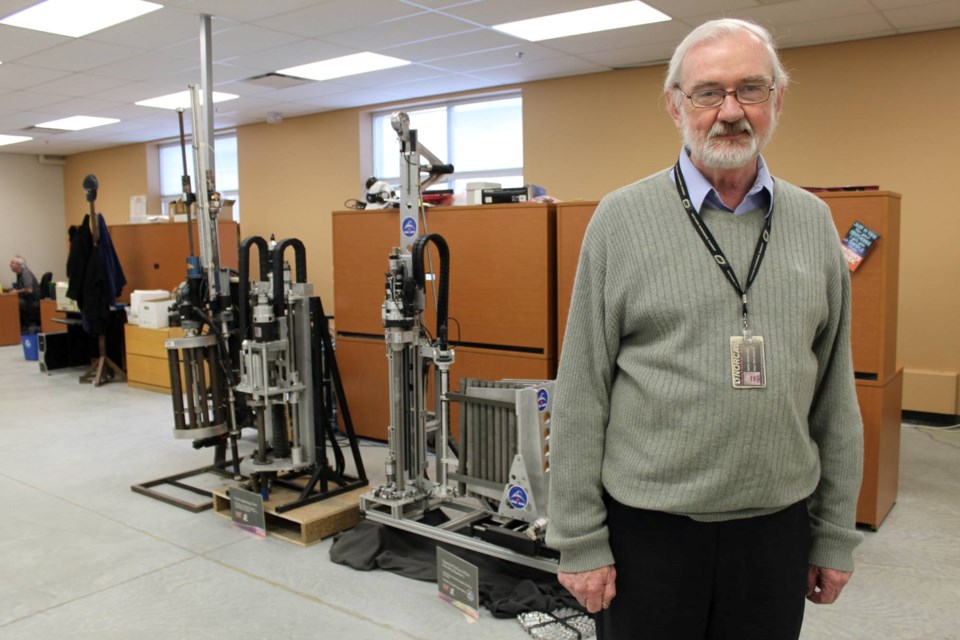Darryl Lake, the affable educator-turned-innovator who set the wheels in motion to establish NORCAT, Sudbury’s regional innovation centre, has died at the age of 82.
Lake died in Sudbury on Sept. 16.
“Darryl will be remembered as a true visionary, for his sense of humour, and for having the kindest heart,” his obituary reads. “Above all, it was his family, his friends, and helping people that mattered most to Darryl.”
Born and raised in Sault Ste. Marie, Lake attended the University of Ottawa, where he graduated with a bachelor’s degree in organic chemistry. Returning to the Sault, he worked briefly at Algoma Steel before heading back to Ottawa to complete his master’s degree at Carleton University.
After marrying his wife, Gail, and relocating to Sudbury, Lake embarked on a 35-year teaching career at Cambrian College, where he taught chemistry, eventually becoming dean of the school’s Health Sciences, Trades and Technology department.
In a wide-ranging 2022 interview with journalist Norm Tollinsky, Lake said he was frustrated at the continuous migration of skilled graduates out of Sudbury, and he began to brainstorm ideas to keep them in the city.
“I thought, ‘Well, I’m a dean now; what can I do to make the students stay in Sudbury?’” he recalled in the interview.
“Well, it’s obvious: create jobs that the students can go to.”
That sparked the idea for the Northern Centre for Advanced Technology (NORCAT), which launched at Cambrian in 1995.
NORCAT started small, first serving as an Occupational Health and Safety Resource Centre before developing training courses in areas such as ground control and underground hard rock common core.
It quickly became apparent that trainees could benefit from having their instruction in an actual mine. Lake approached Falconbridge about the idea, which was receptive, and NORCAT acquired the former Fecunis Mine in Onaping, north of the city.
“We took over the mine because we really wanted to teach ground control, and what better place to teach ground control, rather than in a classroom, but in a mine?” Lake said. “So we said, ‘Let’s do it,’ and that’s how we got started.”
Watch Darryl Lake tell the story behind the idea for NORCAT below:
But it was while attending a conference hosted by the Institute of Technology at Durham College in the early 2000s that Lake envisioned what NORCAT could become: an innovation hub where companies could get support in creating and developing new ideas and products, creating spinoff jobs in the community.
“When I went to the conference with (Cambrian's then-president) Glenn Crombie and saw what a tech centre could do to create jobs in the Durham region, I thought, ‘We’ve got to do something like that in Sudbury,’” Lake said.
The first NORCAT building, which was supported with $3.5 million from the Northern Ontario Heritage Fund, was attached to Cambrian.
As the space filled up, Lake set to work drumming up interest for a larger, stand-alone facility, raising $12 million from government and public partners — including Inco (now Vale) and Falconbridge Xstrata (now Glencore) — for a new building on Maley Drive in the city’s New Sudbury neighbourhood.
Modelled after Technopolis in Oulu, Finland, the open-concept workspace is equipped with offices and laboratories where companies can develop and test prototypes, while networking with like-minded innovators.
It opened in 2009.
“We filled the new building faster than we could ever imagine,” Lake said.
A number of well-known companies had their origins at NORCAT, among them Verv Technologies, Jannatec, Tesman, and BESTECH.
Lake estimated that 90 per cent of people who went through NORCAT’s internship program landed permanent jobs after completion — a fulfillment of his original goal to retain people in Sudbury.
For his contributions to the city's economic development, Lake received a Community Builders Award of Excellence in 2008.
(The Community Builders Awards program was an initiative of Northern Life, the predecessor to Sudbury.com and a sister publication to Northern Ontario Business.)
Lake retired in 2012, but his legacy remains.
Today, NORCAT offers a mix of resources in training, innovation, prototyping and testing at its Sudbury facility, and at the underground centre and mine in Onaping. Its training programs are available through satellite locations in Timmins, Thunder Bay, Toronto and Nevada, and NORCAT remains the only technology centre in the world with its own mine.
Lake said the driving force behind his work over the years has been the desire to build something new, which combined his love of teaching with his innate creativity.
“That newness is a fundamental part,” he said. “ A fundamental part is you’ve also got to like meeting and talking to people.
“If you like people, you can always do things that you never thought you could do before, because they help you,” Lake added. “And I met a lot of awfully, awfully good people.”
Lake leaves behind Gail, his wife of 60 years; his children Andra, Deirdre, and Melanie; along with brothers Kayll and Jude; and many grandchildren.
A service in Lake’s memory will be held at the R.J. Barnard Chapel at the Jackson and Barnard Funeral Home in Sudbury on Monday, Sept. 23 at 10 a.m. Friends may call from 1:30 p.m.-4:30 p.m. Sunday or after 9:30 a.m. on Monday.




